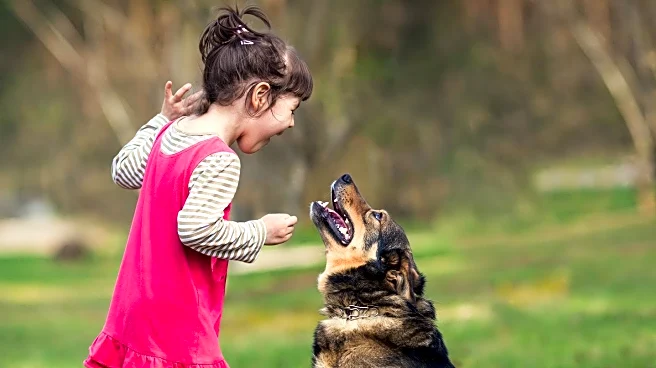What is the story about?
What's Happening?
Dog training experts emphasize the importance of managing expectations and building a relationship with pets. Amanda Gagnon, a zoologist and dog trainer, highlights that training should be about communication and relationship-building rather than achieving perfection. Unrealistic standards, often influenced by social media, can lead to frustration. Alex Sessa, a trainer from Atlanta, advises adjusting expectations to suit individual dog personalities. Experts recommend giving dogs time to settle into new environments and focusing on essential commands like 'sit' and 'come'. Training should be functional, based on the dog's and owner's lifestyle needs, and should not exceed 10-15 minutes daily. Socialization is crucial for puppies, involving positive exposure to various environments and people.
Why It's Important?
Proper dog training is vital for ensuring the safety and happiness of both pets and their owners. Mismanaged expectations can lead to behavioral issues, which may result in stress for both parties. By focusing on communication and understanding, owners can foster a more harmonious relationship with their dogs. This approach can prevent potential behavioral problems and enhance the quality of life for pets. Additionally, understanding the individual needs of dogs can lead to more effective training, reducing the likelihood of frustration and abandonment. The emphasis on socialization and functional training ensures that dogs are well-adjusted to their environments, promoting public safety and responsible pet ownership.
What's Next?
Dog owners are encouraged to seek professional help if they encounter significant behavioral issues, such as aggression or anxiety. Trainers can provide tailored advice and support, ensuring that both the dog and owner are equipped to handle specific challenges. As more people adopt pets, the demand for qualified trainers is likely to increase, highlighting the need for accessible training resources. Owners should also consider enrolling their dogs in well-managed training classes to enhance socialization and obedience skills. The focus on individualized training plans may lead to a shift in how dog training is approached, with more emphasis on understanding and adapting to each dog's unique needs.
Beyond the Headlines
The approach to dog training reflects broader societal trends towards personalization and mental health awareness. Just as individuals are encouraged to embrace their unique traits, dogs are recognized as having distinct personalities that require tailored approaches. This shift may influence other areas of pet care, including veterinary practices and pet product development. The emphasis on positive reinforcement and relationship-building aligns with contemporary parenting and educational philosophies, suggesting a cultural move towards empathy and understanding in various aspects of life.















